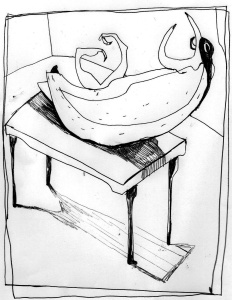В този брой на History of Humanities (издание на Chicago University Press) е вторият форумен блок от публикации на Миглена Николчина, Камелия Спасова, Еньо Стоянов, Мария Калинова и Дарин Тенев. 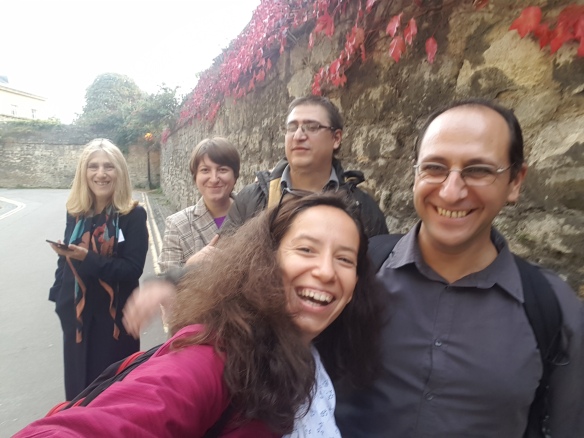 Целта ни не е просто да впишем имената на Никола Георгиев, Радосвет Коларов и други български изследователи в световния диалог, а да демонстрираме релевантността на опита, придобит в усилието да се мисли теоретически в ситуация на репресия. А отвъд това – да докажем, че „режимите на релевантност“ (казано с термин от новата книга на Галин Тиханов) на теоретичното мислене не са останали в миналото, а са може би в още по-голяма степен предизвикателство днес, когато срастването на пазара с новите медии поражда тоталитароподобни структури и нагласи.
Целта ни не е просто да впишем имената на Никола Георгиев, Радосвет Коларов и други български изследователи в световния диалог, а да демонстрираме релевантността на опита, придобит в усилието да се мисли теоретически в ситуация на репресия. А отвъд това – да докажем, че „режимите на релевантност“ (казано с термин от новата книга на Галин Тиханов) на теоретичното мислене не са останали в миналото, а са може би в още по-голяма степен предизвикателство днес, когато срастването на пазара с новите медии поражда тоталитароподобни структури и нагласи.
Literary Theory in Bulgaria
What is it that is being threatened? Kamelia Spassova, Maria Kalinova, Darin Tenev, Enyo Stoyanov, Miglena Nikolchina in Slavica Tergestina.
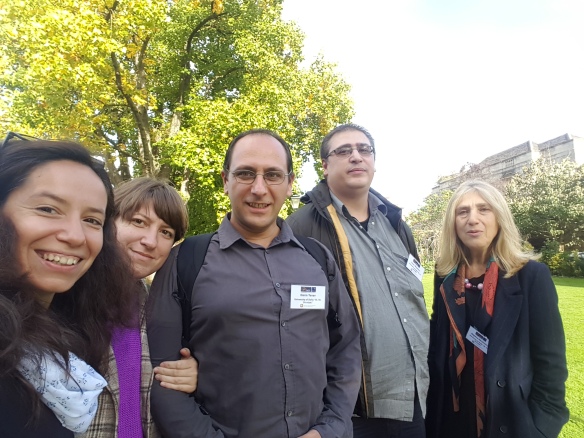
Нова книга на Галин Тиханов
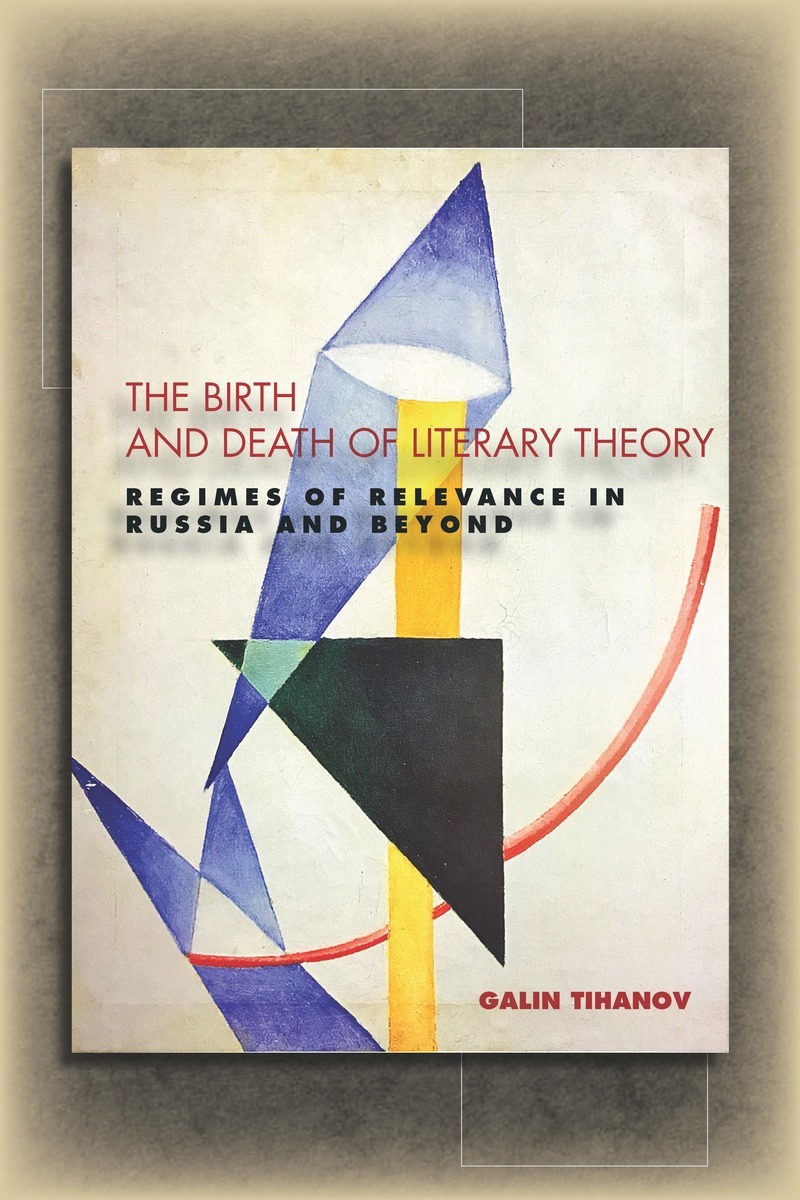 In Russia and beyond, the regimes of relevance are with us still. https://www.sup.org/books/title/?id=22758
In Russia and beyond, the regimes of relevance are with us still. https://www.sup.org/books/title/?id=22758
Forefronts – Derrida
Department of Literary Theory, Faculty for Slavonic Studies, “St. Kliment Ohridski” University of Sofia and Association for Deconstruction
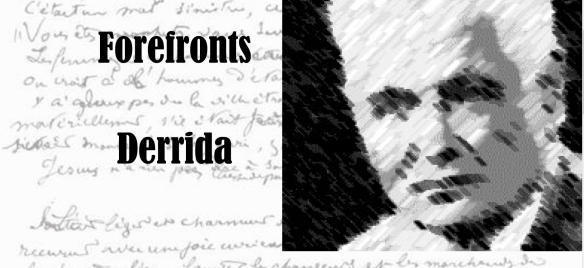
June 25, 2018
New Conference Hall
09:00 – 09:15 Conference Opening
09:15 – 10:00 Daisuke Kamei, Inheritance of Deconstruction: the Question of Language
1964-1965
10:00 – 10:45 Zhana Damyanova, Notion and Concept in Derrida
10:45 – 11:15 Coffee break
11:15 – 12:00 Satoru Yoshimatsu, Bodily Duality? – From Derrida’s Seminar Life Death
12:00 – 12:45 Dimitar Kambourov, Private Doomsday: the Difference that Makes a
Difference or Why is it Difficult for Death to Conceive
12:45 – 14:15 Lunch Break
Hall No.1
14:15 – 15:15 Joseph Cohen, Raphael Zagury-Orly, Deconstruction and Justice – A Love
Story?
15:15-16:00 Rui Matsuba, The Animality of Hunger
16:00 – 16:15 Coffee break
16:15 – 17:00 Enyo Stoyanov, Derrida’s Demeure: Truth and Literature
17:00 – 17:45 Darin Tenev, Indicating the Impossible, or Why There Is No Method to
Derrida’s Deconstruction
17:45 – 18:00 Closing Remarks
МИМЕТИЧНИ МАШИНИ В ИЗРОДНАТА ДОЛИНА
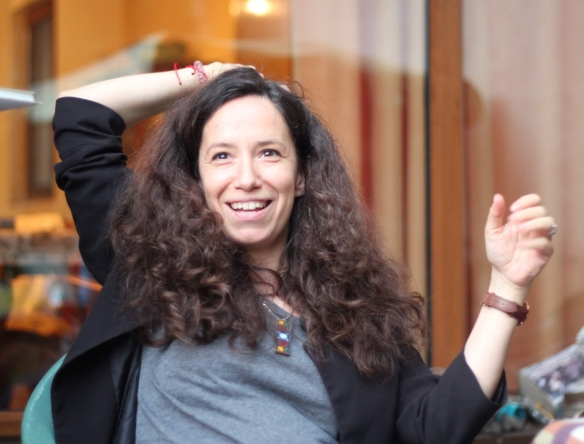 Камелия Спасова
Камелия Спасова
Присъединяването на музата на видеоигрите към сферата на естетическото поражда интересни теоретични отгласи. Естетически, от структурна гледна точка, видеоиграта е толкова поразителен обект! Той сам налага съживяването на релевантността на структурализма и семиотиката с цялата многопосочност на тяхната концептуална апаратура, а не само по отношение на наратологията. (вж. тук и тук) Наложително лице в лице с виртуалното и със завладяващата увлекателност – или направо завличането – в игрите се оказва да си припомним и конципириането на реализма, мимезиса, правдоподобността, отстранението и т. п. Най-сетне психоаналитичната проблематика сама се натрапва от двете страни на монитора.
„Нечовешките фигури – восъчните статуи, куклите, марионетките, задвижените механизми, антропоморфните автомати, въобще
миметичните машини – са способни да ни хвърлят в непонятен ужас, да предизвикат обезпокоително-странен ефект, да тревожат човешкото, защото в тяхната имитация, в уподобяването им на човека нещо не е както трябва. Автоматизмът на изкачащото скрито дъно е основен при този…
View original post 228 more words
Robert Matthias Erdbeer. On the Verge of the Game: Postnarrative and Playability in Independent Gameplay
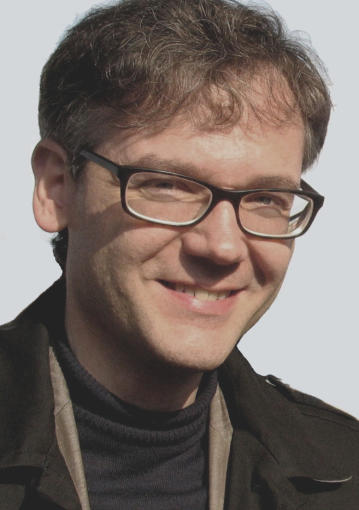 Robert Matthias Erdbeer
Robert Matthias Erdbeer
Роберт Матиас Ердбеер преподава в Мюнстерския университет и е чест гост в България във връзка със серията от международни работилници, организирани от Катедрата по теория на литературата и Катедрата по германистика към Софийски университет „Св. Кл. Охридски” и докторантското училище „Литературна форма” към Мюнстерския университет.
В текста, който публикуваме с негово съгласие, той подхожда към все още несъстoялия се според него дебат между лудология и наратология през призмата на независими видеоигри като Притчата Стенли (The Stanley Parable), Пътеката (The Path), Скоро ще е лято (Bientôt l’été).
It has been claimed that storytelling, or more generally speaking: narrative, along with playing are the ontological foundations, or the universals, of humanity. However, what will happen with these universals once they are entangled in the practice of contemporary gaming? And, no less important, what will happen when these popular performances refrain from being popular…
View original post 48 more words
The Making of Humanities VI | Oxford
MOH VI final conference booklet
International Board: Rens Bod, Christopher Celenza, Hent de Vries, Julia Kursell, Fenrong
Liu, Jaap Maat, Helen Small, Thijs Weststeijn
Local Organizing Committee: Helen Small, Hampus Östh Gustafsson, Laura Miller
The Society for the History of the Humanities
29th September 2017, Brittain Williams Room
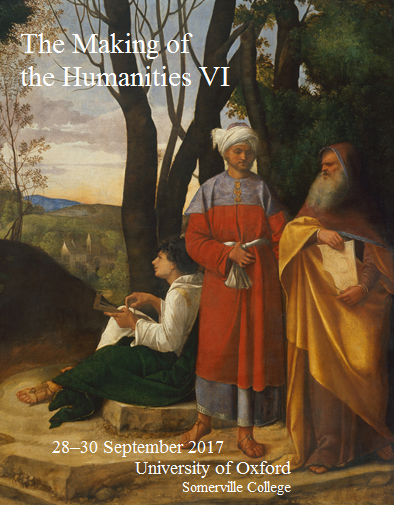 Invisible Battles: The Political Stakes of Literary Theory in Eastern Europe
Invisible Battles: The Political Stakes of Literary Theory in Eastern Europe
Chair: Julia Kursell (University of Amsterdam)
• Darin Tenev (University of Sofia “St. Kl. Ohridski”), Language Models and the Study of
Literature (Bulgarian Guillaumist School vs. Roland Barthes and the Saussurean Legacy)
• Kamelia Spassova (University of Sofia “St. Kl. Ohridski”), Transforming the Concept of
Mimesis: Yuri Lotman and Todor Pavlov
• Enyo Stoyanov (University of Sofia “St. Kl. Ohridski”), Lines of Dissention: The Political
Dimensions of Bakhtin’s Early Reception
• Maria Kalinova (University of Sofia “St. Kl. Ohridski”), Ideology Behind Our Back:
Ideologeme and Aesthetic Event
• Miglena Nikolchina (University of Sofia “St. Kl. Ohridski”), Literary Theory in Action: the
Case of Metamorphosis
Димитър Вацов, Биляна Курташева и Божана Филипова ще говорят за работата на СЛС върху Кафка
Картинка
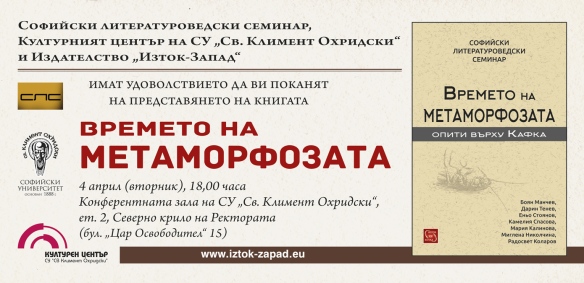
International Consortium of Critical Theory Programs
Софийският литературоведски семинар – наред с още няколко български научни и образователни центрове – е включен в Международния консорциум на програми за критическа теория. За повече информация вж. тук
The Kristeva Circle: Stockholm, Sweden
October 13-16, 2016, Stockholm, Sweden
Keynote Speakers: Miglena Nikolchina & Eivind Engebretsen
Honorary Guest and Speaker: Julia Kristeva
Preliminary Conference Program: PDF
 Thursday October, 13, Södertörn University
Thursday October, 13, Södertörn University
15.00 -16.00 Registration, Södertörn University
I. MC221
Panel: The Early Kristeva and the Chance of Semiotics
a) Darin Tenev, Semiotics as the Making of Models
b) Enyo Stoyanov, Process and Ruination in Revolution in the Poetic Language
c) Maria Kalinova, The Concept of “ideologeme” in Kristeva’s Semanalysis
d) Kamelia Spassova, Dual Codes: the Semiotic and the Symbolic in Lotman and Kristeva
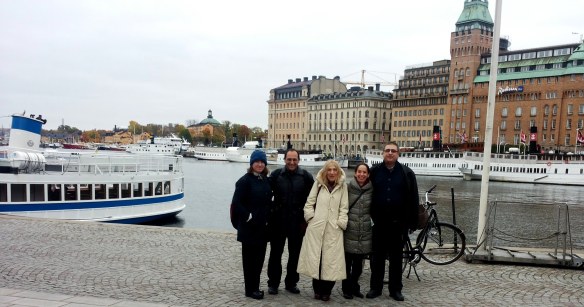
Японско-български форум „Въображението на философията”
21-22 септември 2016
Организиран от Боян Манчев, Футоши Хошино, Камелия Спасова, Васил Марков и Дарин Тенев
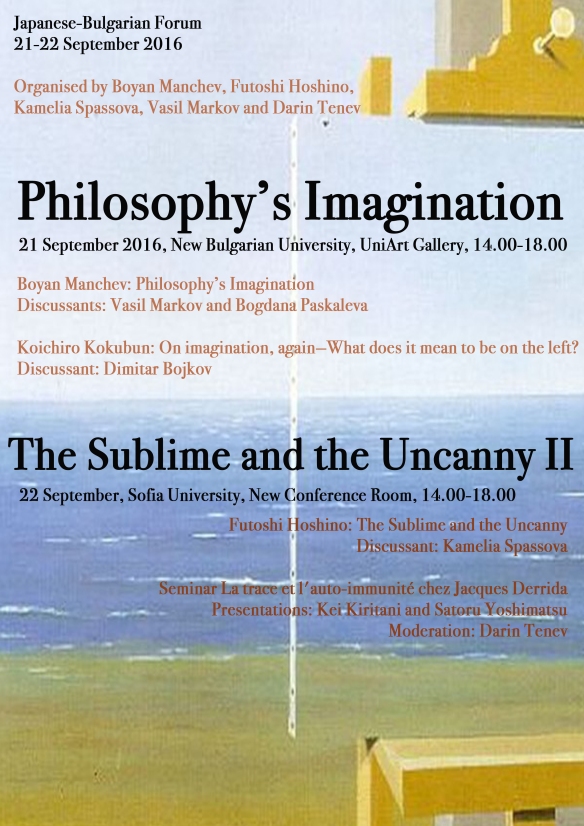 Двудневният българско-японски форум Въображението на философията ще представи в лекционен и семинарен формат актуалните изследвания на японски и български философи и теоретици на изкуството. Предложената експериментална тема, Въображението на философията, предполага не само обсъждането на категорията въображение в рамките на философията, но и на способността на философията да въобразява понятия, да произвежда рефлексивни образи и фигури.
Двудневният българско-японски форум Въображението на философията ще представи в лекционен и семинарен формат актуалните изследвания на японски и български философи и теоретици на изкуството. Предложената експериментална тема, Въображението на философията, предполага не само обсъждането на категорията въображение в рамките на философията, но и на способността на философията да въобразява понятия, да произвежда рефлексивни образи и фигури.
Форумът ще се проведе на английски език. Program in English below
View original post 305 more words
Нова книга на Радосвет Коларов Radosvet Kolarov’s New Book
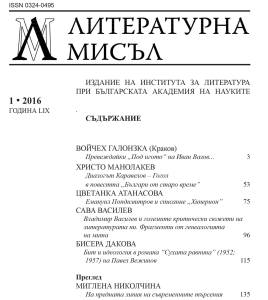
(For English, see below) Миглена Николчина. На предната линия на съвременните търсения. Рецензия за новоизлязлата книга на Радосвет Коларов. Елин-Пелин (София: Просвета, 2016).
(резюме) Коларов предлага иновативен прочит на един автор колкото класически, толкова и пренебрегван теоретически през последните десетилетия. Подходът му демонстрира познатото ни още от „Звук и смисъл“ майсторство да работи с всички регистри на художествения текст. Заедно с това, като проследява трансформативните ефекти на сетивно-материалните страни на художествената проза, Коларов по бележещ нови пътища начин отваря анализите си както към концептуалните „трансмодалности“ между философията и другите хуманитарни сфери, така и към културологичния ангажимент със социалното и политическото. Един прочит, който радикално преобразява клишираните представи за Елин Пелин.
Miglena Nikolchina. New Vistas for Theoretical Investigation A review of Radosvet Kolarov’s book Elin-Pelin (Sofia: Prosveta, 2016).
(abstract) The book presents a ground-breaking reading of a classical Bulgarian author who has been mostly neglected by theoreticians in recent decades. Kolarov’s approach demonstrates his capacity to work with all registers of the literary text, which has marked his writing ever since Sound and Sense (1983). By closely following the transformative effects of the material aspects of fiction, he innovatively opens his analyses to the conceptual “transmodalities” between philosophy and other spheres of the humanities, while remaining sensitive to facets of social and political engagement. After Kolarov’s reading, Elin Pelin will never be the same.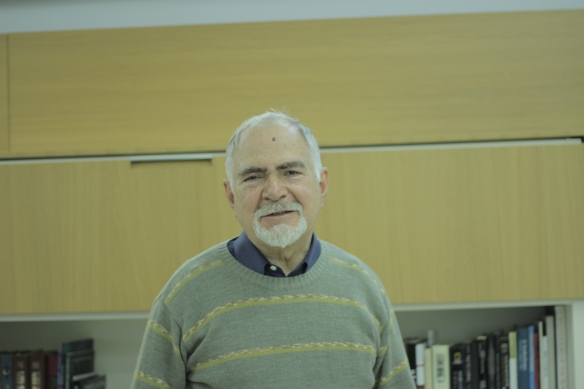
Pandora’s Daughters
As of yet, ON THE BLIND SPOT authors have been Alain Brossat (PLEBS INVICTA), Maurizio Lazzarato (The Making of the Indebted Man), and Giovanni Leghissa (Verfirmung der Gesellschaft/Incorporating Society). The series will continue in 2016 with its fourth edition called Pandora’s Daughters in collaboration with philosopher Boyan Manchev.
Linguistic encounters: the performativity of active listening
24 June 2016, New Conference Room, Sofia University
Beata Stawarska University of Oregon
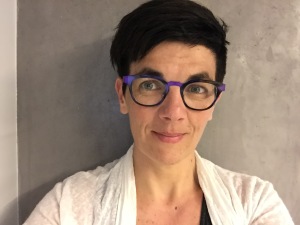 In my talk, I examine social encounters in language by combining an inquiry into individual saying acts (otherwise called speech-acts) with a reflection on how the enabling and constraining social conditions impact the success of such acts in the present. In other words, I propose to work at the intersection of a micro-sociology of social encounters with a larger structural focus on historically contingent social positions. Yet my overall task is not only diagnostic but also emancipatory, and I seek resources for resisting the received and sedimented social relations of power, including at the level of the individual sayings themselves. I therefore recover Bourdieu’s central claim that language mirrors social conditions of power operative in our not-solely-linguistic lives but emphasize, in agreement with Butler’s conception of linguistic performativity, that an ongoing linguistic practice does not solely reflect but can also resist and revise dominant distributions of power by enacting novel social relations through the saying acts. I argue that both Bourdieu’s and Butler’s understanding of the language-power structure will benefit from integrating additional insights from speech act theory, specifically regarding the importance of the hearer’s uptake for a successful or felicitous performance of a speech act. Speech is typically thematized in terms of the vocal production made by an individual speaker or a group but I will argue, drawing on Austin and in agreement with Hornsby and Langton, that the hearer’s uptake, which includes at least minimal receptiveness to what the speaker is saying, constitutes an integral and active element of the total speech situation. Defined in this way, uptake belongs to the language and power structure since granting the speaker minimal receptivity can enable a speech act to function as such (for example, an attempted order to become an accomplished one) while withdrawing minimal receptivity can make the speech act flounder. I turn to Irigaray’s philosophy of dialogue across sexual difference to make a case for active listening as an emancipatory strategy that can re-authorize speakers who have been socially disempowered on account of their gender. Throughout, I seek to both recognize the weight of inherited social conventions in language and to recover the capacity for sociolinguistic renewal within the partially unscripted and potentially innovative interactions between language users in the present
In my talk, I examine social encounters in language by combining an inquiry into individual saying acts (otherwise called speech-acts) with a reflection on how the enabling and constraining social conditions impact the success of such acts in the present. In other words, I propose to work at the intersection of a micro-sociology of social encounters with a larger structural focus on historically contingent social positions. Yet my overall task is not only diagnostic but also emancipatory, and I seek resources for resisting the received and sedimented social relations of power, including at the level of the individual sayings themselves. I therefore recover Bourdieu’s central claim that language mirrors social conditions of power operative in our not-solely-linguistic lives but emphasize, in agreement with Butler’s conception of linguistic performativity, that an ongoing linguistic practice does not solely reflect but can also resist and revise dominant distributions of power by enacting novel social relations through the saying acts. I argue that both Bourdieu’s and Butler’s understanding of the language-power structure will benefit from integrating additional insights from speech act theory, specifically regarding the importance of the hearer’s uptake for a successful or felicitous performance of a speech act. Speech is typically thematized in terms of the vocal production made by an individual speaker or a group but I will argue, drawing on Austin and in agreement with Hornsby and Langton, that the hearer’s uptake, which includes at least minimal receptiveness to what the speaker is saying, constitutes an integral and active element of the total speech situation. Defined in this way, uptake belongs to the language and power structure since granting the speaker minimal receptivity can enable a speech act to function as such (for example, an attempted order to become an accomplished one) while withdrawing minimal receptivity can make the speech act flounder. I turn to Irigaray’s philosophy of dialogue across sexual difference to make a case for active listening as an emancipatory strategy that can re-authorize speakers who have been socially disempowered on account of their gender. Throughout, I seek to both recognize the weight of inherited social conventions in language and to recover the capacity for sociolinguistic renewal within the partially unscripted and potentially innovative interactions between language users in the present
June Readings of the Sofia Literary Seminar with the Participation of Beata Stawarska
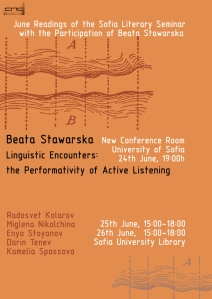 24th June, New Conference Room, University of Sofia,
24th June, New Conference Room, University of Sofia,
19:00. Beata Stawarska. Linguistic Encounters: the Performativity of Active Listening
25th June, Sofia University Central Library
12:00~13:00. Miglena Nikolchina. Will You Stay Here: Commons Ex Machina
13:00~14:00. Enyo Stoyanov. Kristeva and Deleuze on the Notion of Process
14:00~15:00. Darin Tenev. Theory and Modeling. Lévi-Strauss, Badiou, Kristeva and the Modeling Activity
15:00~16:00. Radosvet Kolarov. Hesitation, Undecidability, and Desire for the Other
16:00~17:00. Kamelia Spassova. Mimesis and Modeling: Lotman’s Double Structures
17:00~18:00. Discussion: Lotman, Kristeva, and the Question of Theory
Запис от дискусията за „Елин-Пелин“ от Радосвет Коларов
Съкратени версии на текстовете за „Метаморфозата“
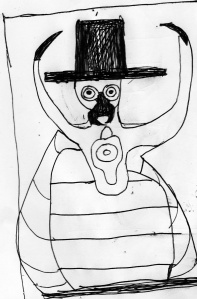
В „Литературен вестник“, с прекрасни илюстрции от Александър Байт ошев.
ошев.


